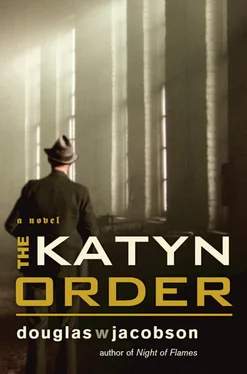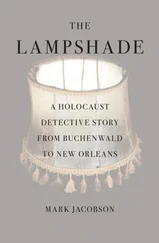The AK commandos took turns carrying the stretcher as dirt and plaster rained down on their heads following each random burst of artillery. Berta moaned and occasionally thrashed, then drifted into unconsciousness again. With the stench of human sweat, excrement and urine mingled with must and kerosene from the lanterns, Natalia found it difficult to breathe. Her headache returned.
A half hour later, they climbed a flight of rickety wooden stairs and emerged from the last cellar. Natalia squinted against the sunlight and took a welcome breath of fresh air as she peeked around the corner at the open expanse of the cobblestone square in front of the Royal Castle.
They huddled for a moment. Rabbit gave each of them precise instructions: “Zeeka, you and Bobcat man the stretcher. Natalia and Ula, one on each side, with a hand on Berta. I’ll lead the way.”
“We’re gonna have to run like hell across the square,” Bobcat said.
“Yeah, I know.” Rabbit looked around at the others. “I’ll be the lookout. You all stay right behind me. Keep your heads down and don’t trip.”
With that, the group sprinted across the Castle Square, past Zygmunt’s Column and turned onto Podwale, with Rabbit watching the sky and glancing at rooftops every step of the way.
The former schoolhouse was a four-story red-brick building located at Number 46 Podwale, the semi-circular street fronting the old city walls. At one time a neighborhood of wealthy merchants and aristocracy, it was now mostly deserted, a grim collection of broken windows and shattered roofs. The windows of the school building were boarded up, and a large red cross was painted on the door. “I hope they also painted one on the roof,” Natalia mumbled as they trudged up the steps and pushed open the door.
The scene inside was overwhelming. Natalia’s head pounded as she glanced around: Kerosene lanterns cast a gloomy, yellow glow. Cots lined every inch of the floor with barely enough room for the nurses to squeeze through to groaning patients. The stifling air reeked of disinfectant, blood and urine.
A priest looked up from beside one of the cots. He held a blood-soaked bandage against a small boy’s head with his right hand. With his left, he pointed toward the back of the room.
Natalia led the way as they carefully navigated the stretcher between the rows of cots to the farthest alcove where a stout, elderly nun wiped blood off her hands with a sliver of cloth obviously torn from her habit. The nun tossed the soiled rag into a bucket of red water and plodded over to the stretcher. She shot a cursory glance at Berta’s bandaged leg, placed a pudgy hand on her forehead and shrugged. “Not much of a fever yet, so that’s a good sign.” She motioned wearily toward a staircase that led to the cellar. “Take her downstairs. There are a few empty cots at the back. I’ll keep an eye on her.”
“What about antibiotics?” Natalia asked. “There’s seepage from the wound. We’ve got to prevent infection.”
The nun glared at her as if she’d asked for gold bars. “Young lady, we barely have clean bandages and water.” Her brow furled. “Do you have any medical training? If you do we could use some help here.”
Zeeka glanced at her watch and shook her head. “We have to meet Colonel Stag, and we’re already late.”
“Maybe later,” Natalia said to the nun. “Later I could—”
The nun waved her hand dismissively and turned her attention to a sobbing young girl, no more than ten years old, with ragged shrapnel wounds in her neck and chest. “We’ll keep an eye on her and check the wound,” she snapped. “A doctor should be around a bit later. Take her down and find a spot for her. I’ll check on her later.”
Zeeka put a hand on Natalia’s shoulder. “It’s the best we can do for her. Now we’ve got to go.”
Natalia came back early the next morning, grimacing at the stench as soon as she stepped through the door. She hadn’t thought it possible to jam any more patients into the tiny, stifling hot schoolhouse, but apparently they had. She scraped her knee trying to wedge between two cots in the narrow aisle, now almost impassable since they’d added another row. Halfway through the room, she stopped and gripped the out-stretched hand of an elderly man. His eyes were bandaged, his withered face pockmarked with shell fragments. When she kissed his grizzled cheek, he wheezed a barely audible “thank you.”
At the top of the stairway she encountered the elderly nun carrying an armload of soiled sheets. Without breaking stride, the nun motioned with her head toward the stairs. “There’s a young boy down there who came in an hour ago with a head wound. Find a clean bandage and change the dressing. He’s over in the corner near your friend. You can check on some of the others while you’re down there.”
Natalia nodded and descended the stairs to the cellar. She made her way carefully through the jam-packed room, smiling at patients who were awake, touching a few hands, patting a few shoulders. In the middle of the room, another nun, younger and harried-looking, knelt next to a man and cut away his blood-soaked trouser leg. The man gripped the sides of his cot, eyes closed, jaw clenched.
Natalia bent down and took a closer look, then whispered to the young nun, “It’s a bad break, but the bone isn’t exposed. We can probably splint it to make him more comfortable. I’ll be back to help you in a few minutes.”
Natalia found the boy with the head wound, curled up in the fetal position, sucking his thumb. He appeared to be about seven or eight years old, stick-thin and pale as a ghost. She knelt next to the boy’s cot and put her hand on his forehead. “Are you awake?” she asked quietly.
He nodded, but didn’t lift his head.
“I’m here to help you. May I look at your wound?”
He nodded again, then whimpered, “It hurts.”
“I’ll be very gentle,” she said. She slid her right hand under his skinny shoulder and gently rolled him onto his back. The boy groaned. His eyes were shut tight.
Carefully, Natalia unraveled the bloody bandage and examined the wound. It was a jagged laceration that extended from just above his left eyebrow, across his forehead, ending just above the hairline. It wasn’t deep, and the blood had coagulated, but the wound was filled with dust and grit.
After gathering a bowl of water, a few clean rags and tweezers, Natalia painstakingly extracted the bits of dirt and gravel, and cleaned the boy’s wound. Tears trickled down his cheeks and he gritted his teeth the whole time, but he didn’t cry. She wrapped his forehead with the last clean scrap of cloth she could find, wishing again for antibiotics. She stayed with him for a while, telling a few stories, until he seemed to fall asleep.
She checked on Berta, but her friend was also asleep. Her face was flushed, her brow furled with pain. Natalia decided to let her rest, and spent the next three hours doing what she could to help the priest and two nuns in what was clearly a futile effort.
Dozens of people—many of them no older than Rabbit—lay semiconscious on blood-soaked cots, with mangled hands or feet, chest wounds, burns or shrapnel wounds. They groaned and twitched. Sweat dripped from their ravaged, soiled bodies. Natalia knew most of them wouldn’t survive more than a few days without real medical attention.
Finally, Natalia wiped blood from her hands and sweat from her forehead, and went back to see Berta. She edged her way through the line of cots, carrying a tin cup half full of precious, scarce water.
Berta’s eyes were open now, and she managed a smile when Natalia knelt down and took her hand. “How do you feel?”
“Awful,” Berta croaked. “It’s so damn hot… I can barely… breathe.” Her face glistened with perspiration, and Natalia put a hand on her forehead. The cellar was sweltering. Natalia was so hot herself it was impossible to tell if Berta’s fever had worsened. And even if it had, there was nothing they could do about it.
Читать дальше












